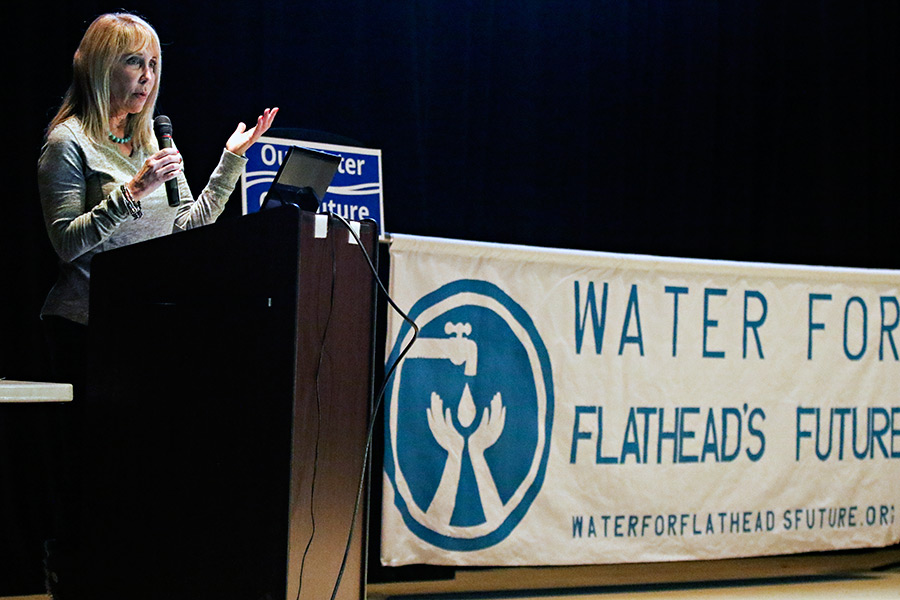Dozens of people gathered at Flathead High School’s auditorium on Wednesday night to hear from a local group dedicated to opposing a proposed water-bottling facility in Creston.
Water for Flathead’s Future, formed last spring, held the event to introduce their cause to the wider Flathead Valley. Chairperson Deirdre Coit introduced the group’s declared mission, which is to advocate for the “sustainable use of our surface and underground water resources” for all.
Coit and board member David Eychner, a retired attorney, spoke for about half an hour about their mission to halt the Montana Artesian Water Co., owned by Creston landowner Lew Weaver.
The plant came under public scrutiny last year when the water-right permit with the Department of Natural Resources and Conservation sought
permission to draw up to 710 acre feet of water annually from the underground aquifer near Egan Slough along the Flathead River. That equals about 1.2 billion 20-ounce water bottles.
The permit would also allow Weaver to produce up to 140,000 water bottles per hour, 24 hours a day, 365 days a year at a facility on his farmland
WFFF is concerned about the amount of water Weaver intends to pull from the ground. The DNRC issued a preliminary determination to grant the permits last January, which means the applicant has completed the necessary criteria. It was not a water right issuance, Kathy Olsen, manager of DNRC’s Kalispell Regional Water Office, said.
Coit said she is part of a group of what are considered “valid objectors” opposing the permit through DNRC. They have a hearing scheduled to go over those objections with the state on May 23. Olsen said this hearing is a regular part of the process.
WFFF also pointed out Weaver’s permit to the Department of Environmental Quality for service water discharge, which would allow Montana Artesian Water Co. to wash out newly formed plastic bottles and then discharge that effluent into a tributary of the Flathead River.
Eychner said the group intends to point out the flawed permitting process, and that the state agencies didn’t understand what they were approving.
Objectors to the DEQ permitting process are also calling for a full environmental impact study on the plant. According to Kristi Ponozzo of the DEQ, the department released its draft environmental assessment of the project last summer and asked for comments. Now, the department is reviewing and responding to those comments. If, in the course of the assessment, the DEQ feels the project warrants an EIS, it will begin one, she said. Since the department received “a lot of substantive comments” on the project, it’s still several months out from finishing the environmental assessment.
Also present at the WFFF event were neighbors to the Creston plant who asked the county to expand the Egan Slough Zoning District; the expansion could have an adverse effect on the development of the water-bottling plant.
After the Flathead County Commission rejected the expanded zone last November, the Egan Slough Community filed suit against the county, asking the judge to reverse the decision.
Tom Esch, a Kalispell-based attorney representing Creston farmers John and Amy Waller, spoke at the event and said another piece of the puzzle to fighting the plant is a petition to get the Egan Slough zoning expansion on the ballot for all of Flathead County to decide. The first attempt was shut down after the Flathead County Attorney’s Office rejected the initial petition based on form.
Esch said the petitions will be resubmitted, and the effort will need to collect between 12,000 and 16,000 signatures for the measure to make it to the ballot.
Coit said WFFF is now fundraising for legal costs, and that the group’s organizers are all volunteers. She estimated the group would need about $100,000 to cover legal and other costs leading up to the May 23 meeting. The group also plans to host a fundraiser and screen the movie “Tapped,” about large corporations moving into small communities and commodifying water.
